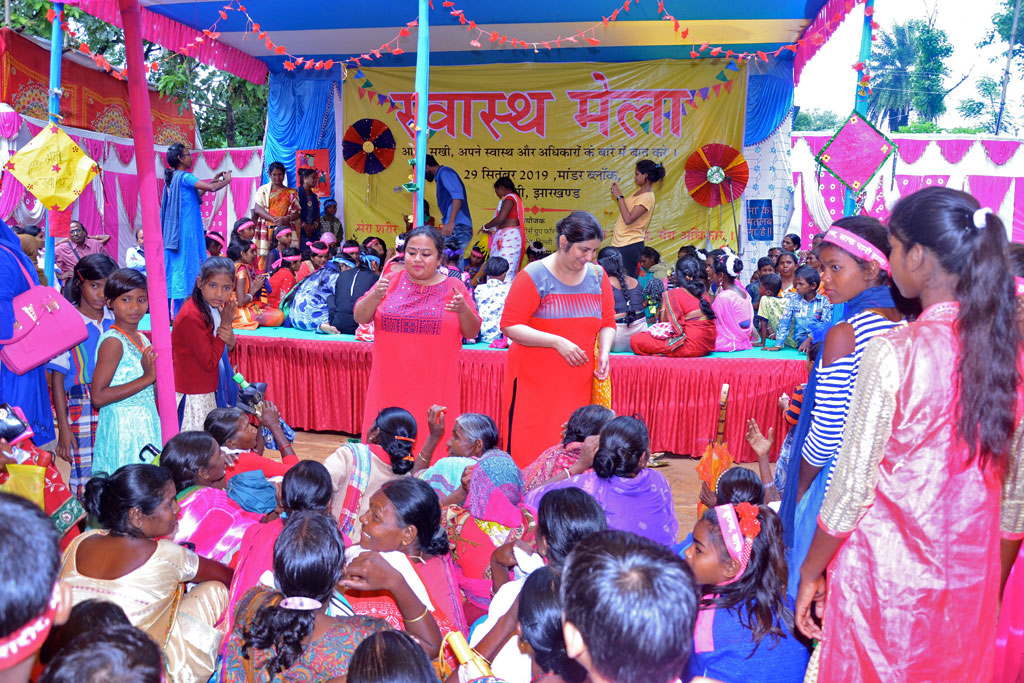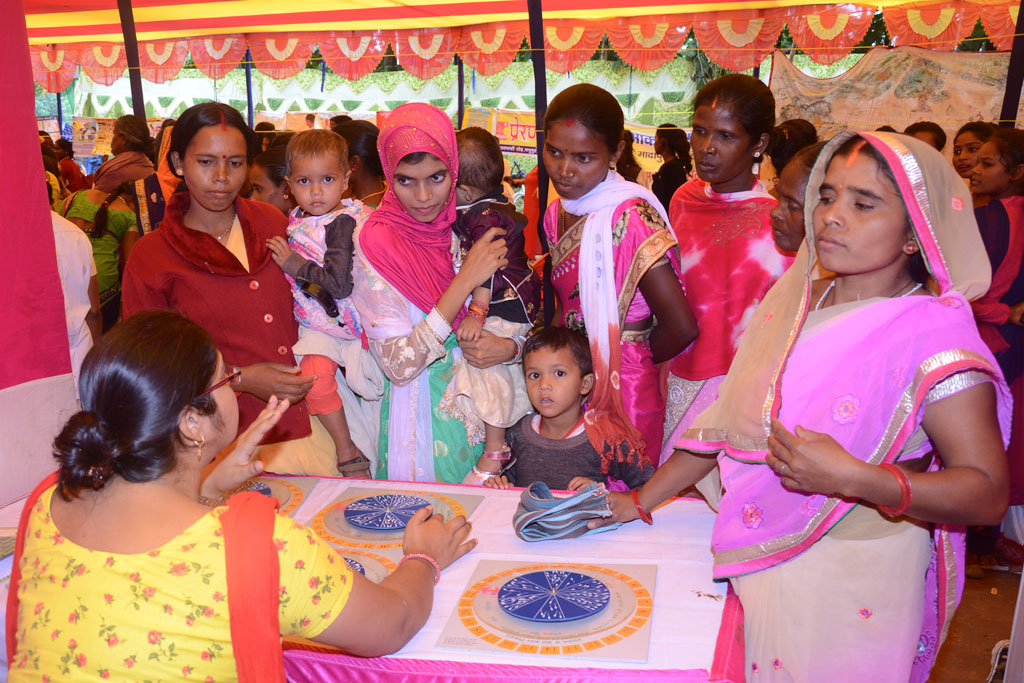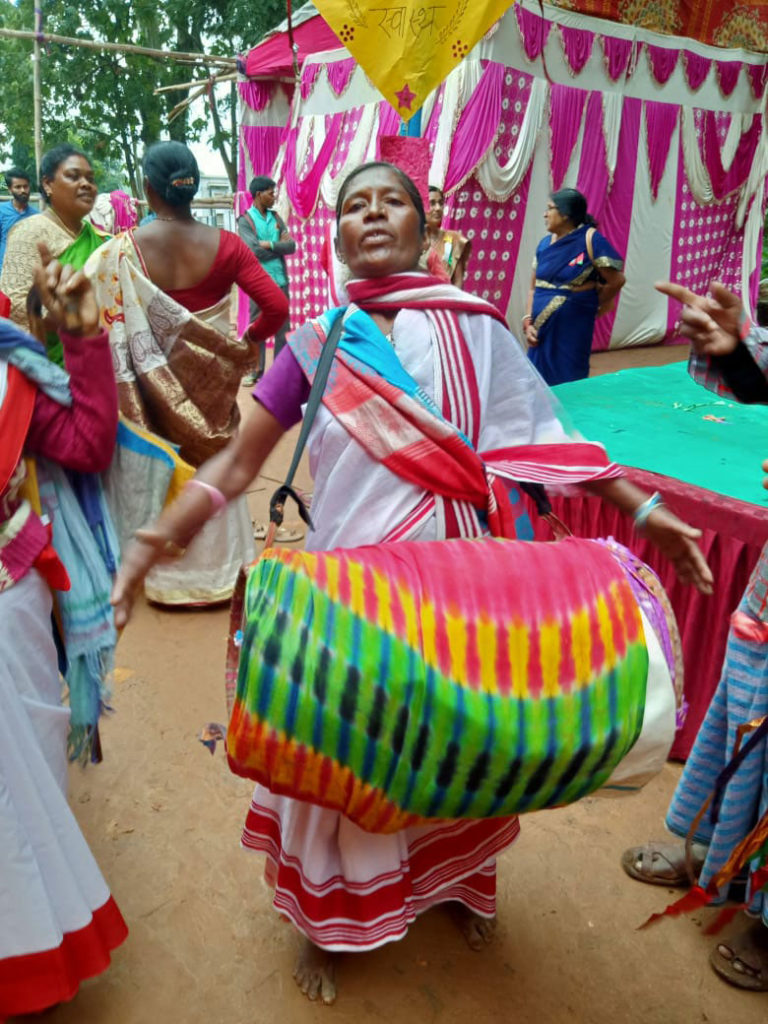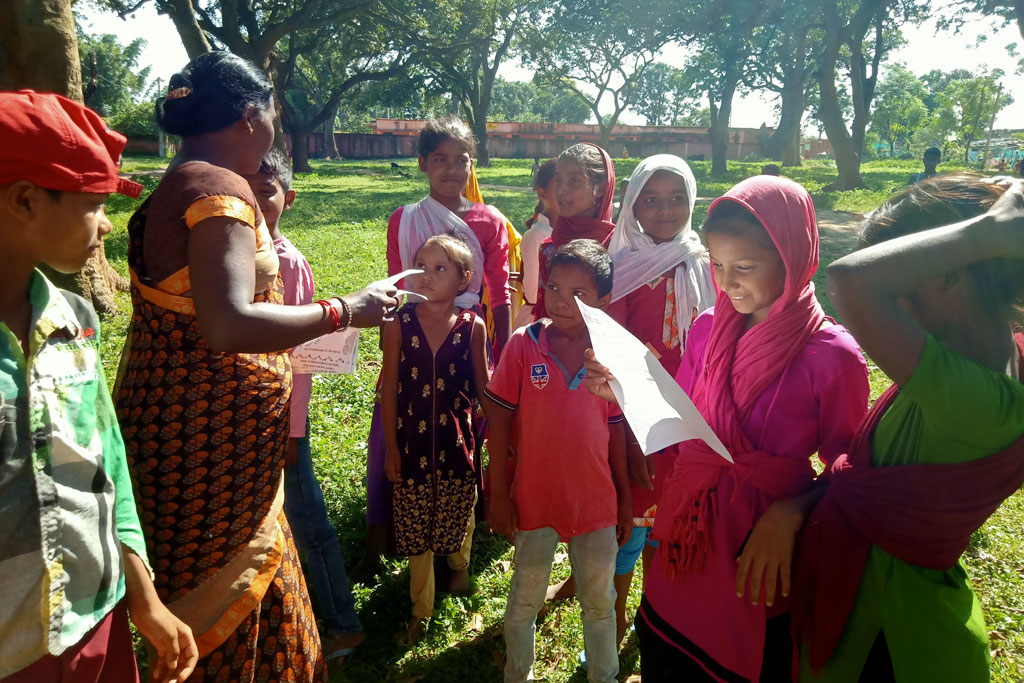
Sama has been working on the issues of Sexual and Reproductive Health and Rights (SRHR) in Jharkhand for the past two years now. The consistent engagement through meetings and workshops with young girls and women from Dalit, Tribal and Muslim communities culminated in a celebratory ‘Swasthya Mela’ – a health festival in Mandar Block, Ranchi. The women and girls who have been part of our workshops developed the Mela’s themes and activities on SRHR and health, aiming to reach out to a larger population of women and girls in the block. The mela also became a platform through which the women and girls took into their hands the logistics and mobilisation which are traditionally seen as male tasks. In doing so, women were able to exercise their agency, which was often discussed in workshops and meetings, and mould the event according to their understanding of sexual and reproductive health and rights, especially keeping in mind the local context.
The Swasthya Mela took place on 29th September 2019, a Sunday, which saw torrential rains. This did little to deter the enthusiasm of the women and girls who came in from forty-five villages and more, thanks to the mobilization which was done by the women themselves. We had over a thousand women and young girls in attendance through the day. The event began with the traditional welcome songs of the Oraon tribe. A theatre group from Lohardaga in Jharkhand performed a play on infertility and the havoc caused by superstition and misinformation in women’s lives and in their families. The mela also had stalls featuring information on the importance of proper nutrition based on locally available fruits, vegetables and grains. The impact of nutrition on women’s health was described through a life-size snakes and ladder game. Two ANMS from the nearest Referral Hospital in Mandar set up a stall which facilitated on-the-spot blood pressure and blood sugar check-ups, along with information on the provisions under the various Government schemes that are especially beneficial for women and girls.

One of the more popular stalls featured Sama’s Fertility Wheel, where many discussions were had on secondary infertility, the consequences of intercourse during various stages of the menstruation cycle, birth spacing, and the importance of open conversations with one’s partners. Women who had been part of the Sama workshops most often correctly answered the queries of their friends.
Another popular stall provided ‘Mehend ke kisse’ —Messages in Mehendi — where girls and women thronged to get messages such as “mera sharir, mera adhikar” (my body is my right) on their palms. Through a session on puppet making, young girls voiced their understanding of consent, especially affirming that ‘no’ means always means ‘no’. Throughout the event, many women and girls took to the stage and spoke about how getting the correct information and knowledge about their health is important, and further encouraged other women and girls to take their health and rights into their own hands.

In another section of the mela, women and girls painted their lives on twenty meters of cloth, including facilities which are available at their villages (hospitals, schools, post offices and police stations), how their houses look, what they eat, their farms, and livestock they own. Many women, who had last held brushes many years ago as schoolgirls, were enthused about expressing themselves again through paint. Many drew the local ‘Sohrai’ designs. A poster exhibition was set up by Sama, Akanksha Seva Sadan (Muzaffarpur, Bihar), and other local organisations, that work on issues related to SRHR. As the evening neared and the skies drew dark, many women and girls broke into spontaneous dance and song, singing about the happiness of liberation and playing the huge ‘dhols’ traditionally played by men. The grounds reverberated with slogans of ‘mera swasthya, mera adhikar’ (my health is my right), ‘mera shareer, mera adhikar’ (my body is my right), ‘meri na ka matlabna hai’ – (my no always means a no).
It is very important to note that this mela was exceptionally handled by the local women and girls, who went from one village to another, dispersing information on SRHR and the mela, along with the help of the Sama team. On the day of the event, these women and girls took their posts as stage managers and volunteers at the various stalls. In the process of planning and implementation of the health mela, many women and girls negotiated and explored spaces which are traditionally dominated by men, and has been one of the biggest take aways from this mela. One could see that the women and girls were more confident in taking up the tasks. In fact, one of the tribal women who actively has been a part of the initiative in Jharkhand recently contested for the post of Sahiya –ASHA in her village and was successful. We hope to continue working with her in bringing better understanding of sexual and reproductive health and rights amongst the community she works with.

Many women and girls who earlier were not part of Sama’s SRHR initiative in Ranchi showed interest and were encouraged to join meetings and discussions with us as well as with local sister organisations such Prerna Bharati, SHARC, PHRN (Public Health Resource Network), Torang Trust, Saheli Adhyan Kendre, and the Jharkhand chapter of the IAWS (Indian Association for Women Studies). This event also helped in weaving in together the various capacity building workshops and meetings which were held with women, girls and NGOs and CBOs, and bring them together on a common platform through which the issues of SRHR, especially in context of Jharkhand were highlighted and brought to the fore. Further, this Mela has been able to put women’s health and rights on the map of the community. While a lot still needs to done, issues such as bodily autonomy, consent and health as rights was discussed and through the continued efforts we hope to bring about a better understanding and take further advocacy initiatives along with the community.




